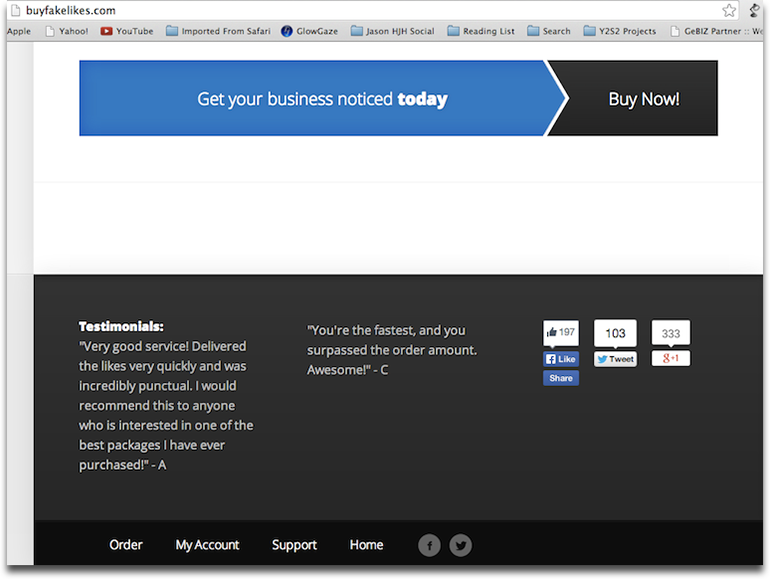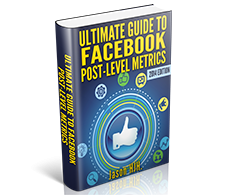Thankfully, after sharing about the worst advice on Facebook Marketing in January, a lot of those negative buzz have gone away.
But there remains a few black sheep among all of us - that also includes our inner black sheep, the desire to cheat the system just so that we can get quick and dirty results that make us look better for the time being.
I understand the problem of the Internet. Because of the wealth of information online and how we need to choose what to read, we only focus on things that seem interesting and useful to us. This mismatch between demand and supply of information online means that you often need to craft a killer headline that grabs attention, sometimes at the cost of factual integrity. As someone who wishes to help others however, I prefer to err on the side of caution when it comes to offering advice.
Myth 1. Don’t look for teens on Facebook
Note: The discussion here involves only teens in US and Canada
A popular Facebook guru recently advised her readers to not look for teens on Facebook. She believes that “Facebook is no longer the place where the cool kids are”.
Although she did cite good data about last year’s teen usage patterns as well as Facebook’s apparent silence about teen usage activities in Q4 2013 results, the truth remains that teen usage has only reversed for a single quarter. That data is hardly enough to support a downward trend.
Although Facebook decided to carefully omit announcements about teen usage in US, it does not necessarily mean that teens are leaving Facebook. Usage rates could be consistent and not worth mentioning, in my opinion., in the bigger picture of Paper’s launch and its stellar advertising revenue.
Data like these also misleads us. It makes us go crazy and become worried! But as so many of you have pointed out, we forget that those “young teens” are no longer young, and they have grown into older age group segments. The main problem with the figure remains multi-fold:
- Is Facebook cutting cost on acquiring new users in US and Canada after its growth spurt?; or
- Is it a double-edge cultural problem where parents are preventing their teenage children from signing up on Facebook and teens are leaving Facebook because their parents are policing them online?; or
- Has the minimum age policy turned its back on Facebook where an overwhelming number of children signed up as teens years ago and they have now grown into new age segments?; or
- Did US and Canada face the problem of having fewer children born in the last decade, translating into a smaller market for Facebook?
All of the reasons cited above could be true - I do not know. But I know what you should take away instead.
What you should take away instead: Reasons for using Facebook have changed
To offer a balanced view, I would recommend you to consider a different channel to reach teens if you are targeting them for the long-term. Although teens will not disappear into thin air (pun unintended), even if they remain active on Facebook and contribute to the DAU figures that Facebook always quote, I believe that Facebook has transformed into a utility for teens.
The problems teens faced have always been with self-expression. They need an environment that encourages self-expression, not oppress it. Parents’ presence do the latter.
The need to express oneself remains the prime reason for the growth of any social network that attracts teenagers.
As a utility, teens use Facebook to check updates of their friends, speak to their friends in private through Messenger (although alternative apps Whatsapp and Snapchat are more popular in this aspect), upload and share photographs with limited exposure, manage their privacy settings and friend lists. They also use it to log into other platforms through social logins.
They are more likely to upload pictures on other platforms like Instagram, while they will continue to upload photographs onto Facebook where a larger number of photographs makes it inconvenient for them to do so elsewhere. Moving forward, you can expect greater levels of integration between Instagram and Facebook, where photos and videos posted on Instagram can reach more users on Facebook, making Facebook the primary channel for discovering all sorts of content that one wants to see.
- Maybe this is what Facebook wants to become: a place to discover all sorts of content Tweet
Myth 2. Contest is a must for any Facebook Campaign
Although the most common form of promotion happening on Facebook today, I do not agree that it is a must for any Facebook campaign. The reason requires us to go back to Marketing 101 - does the problem you are trying to solve call for a contest? If not, you are wasting your dollars.
I thought about this for a while and I think the real problem goes deeper than just the widespread phenomena of Facebook contests. I think it has more to do with management’s pressure on marketers to do something about their sales, and to do it quick. The problem becomes very complicated.
- Management fails to understand that sales is a function of many things, not just marketing.
- Social media marketing, although hyped and effective, is not a panacea. Brian Solis, a brilliant digital analyst, wrote this more than a year ago.
- Marketers, put under pressure, resort to cheap and fast techniques. These techniques include the cheap practices of buying fake Facebook likes and loose Facebook Ad targeting (which someone turned around and used it to call Facebook to fraud). Notice below that these sites used fake testimonials. Why? Because “these services are great”, said no one ever.

What you should take away instead: Give it 10 years.
That is what Brian Solis advised businesses to do. He suggested for businesses to invest in relationships with potential customers today and expect a reward 10 years later. But there are so many people who already make money from Facebook, so why wait 10 years?
Simple.
First, if you ask yourself if you are able to invest in Facebook and other social media platforms for 10 years before you reap your rewards and the first reaction is “HELL NO”, perhaps your business problems run a little deeper than what social media marketing alone can solve.
Next, different people take different time to move through the purchase funnel. I hope you have spoken to some of your customers and found out how your funnel is like and how a social media platform like Facebook fits in. If you have done this, then you need to remember that your potential customers are placed all over this funnel - some are more ready to buy, some need more time. Your marketing efforts need to be sustained and non-linear. Your social media marketing strategy should blend multiple campaigns to move all these consumers through the funnel, while focusing on the most pressing problems (awareness, preference, conversion, or retention)
And where do Facebook contests come in? As you have probably seen on Facebook, our fellow marketers have come up with creative ways of using these contests to meet their end business goals. They can be adapted to fit any part of your strategy - but make sure that they actually fit in well before you decide to use them.
BONUS: More on Facebook Contests
I came across a fantastic guest post last week, written by Emeric, founder of Agorapulse. He shares his experiences in detail about how you should design a contest that reaches your target audience and cut the likelihood of inviting unwanted fans.
In short, the 7 tips are:
- Use prizes that appeal only to your core target audience (Back to Marketing 101 where your promotions tie in to your brand!)
- Promote to identified prospects. Limit the exposure to unidentified prospects using another qualifier
- “Sharing-your-contest” is not always a great idea; non-qualified audience will likely be attracted
- Use low-risk applications
- Review your contest rules to protect yourself
- Be stringent; use a strict entry mechanism
- If irrelevant target audience are attracted somehow, use a Facebook CRM tool like Agorapulse to manage them. This has to be done manually, which is why you should set a strict qualification criteria in the first place! Monitoring these irrelevant target audience will mostly involve you monitoring their activities on your Page (whether they like, comment, share, click on your posts or just participate in your contests)
That’s it! Question? Comment below!




Pingback: These 2 Facebook Myths could Ruin your Business...